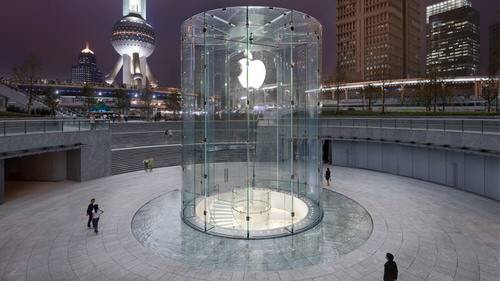
Apple reported its first profit decline in over a decade and bluntly admitted that its growth is slowing. It was, indeed, a strange but not wholly unexpected change of pace for the wildly successful Cupertino company.
Despite that bad news, the stock market barely hiccupped. As of writing, Apple shares were virtually unchanged in after-hours trading from their close of $406.13 — a level roughly 42% below their peak just seven months ago. Which means that these diminished expectations are, for now, Apple’s new normal.
The Humbling Of Apple
In the January-March quarter, Apple generated $43.6 billion in revenue with a profit of $9.5 billion, compared to $39.2 billion and $11.6 billion a year ago. Profits might be down by a not-insignificant 18%, but the numbers still beat out quarterly estimates of between $41 and $43 billion in revenue. For next quarter, Apple set the bar low, with an expected $33.5 to $35.5 billion in revenue.
Apple also set new records for March quarter sales of the iPhone and iPad, for what it’s worth.
While Apple quarterly calls — like Apple launch events, Apple ads and the Apple ethos — tend to err on the side of smug, today’s tone was muted. As Apple’s boomtown empire of the last decade begins to look like a gilded age, CEO Tim Cook and CFO Peter Oppenheimer maintained a cautious optimism. Cook expressed frustration over Apple’s ongoing stock swoon and noted that 2012’s “exceptional success” makes year-to-year comparisons “difficult.”
Other notable numbers from this quarter:
- 37.4 million iPhones sold, up from 35.1 million during Q2 2012
- 19.5 million iPads sold, up from 11.8 million a year ago
- iPad sales more than doubled in China and Japan
- Mac sales contracted, with just under 4 million sold – a slight dip from a year ago
- 5.6 million iPods sold (down from 2012’s numbers), but Apple commands 70% of the MP3 player market
- Apple made $5.2 billion from retail stores and expects to open 30 new stores this year
- The company holds $144.7 billion in cash (up from $137 billion in December 2012)
Still, Apple Is Apple
Of course, even at its humblest, Apple couldn’t resist an opportunity to tout iOS as a more secure ecosystem than Android, which has fallen victim to some high profile malware incidents in the last year.
As for what’s next — and how the company will continue to grow — Cook cited the strength of Apple’s ecosystem and “exciting new product categories” for the company’s bright outlook. Cook also turned an eye to untapped overseas markets, which could play a major role if the company plans for another growth spurt: “China has an unusual number of potential firsttime smartphone owners,” Cook said. “That’s not lost on us.”
Similarly, Cook touted the possibility of “an exciting new product category,” although of course without even hinting at details or a timeframe. So feel free to believe that he meant the iWatch, or an iTV, or, well, iAnything.
Apple also boosted its dividend by 15% and announced a new stock buyback program that aims to return $100 billion to shareholders by 2015, in part by taking some existing Apple shares out of circulation to boost stockholders’ holdings.
Image courtesy of Apple

















